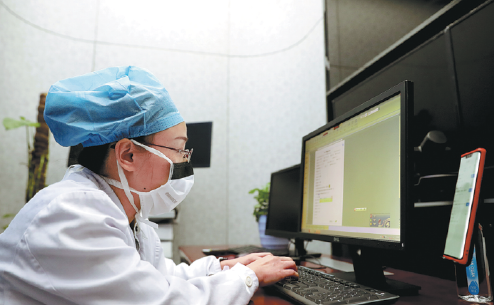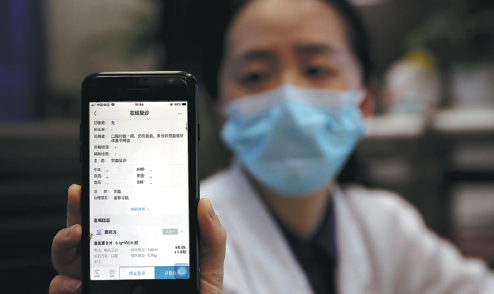E-prescriptions set new medical era's pulse racing
Amid COVID-19, online healthcare services acquire dimensions of sunrise industry

Influenced by the novel coronavirus pneumonia, China's internet-based healthcare services will likely serve over 60 million users this year with a penetration rate of nearly 8 percent, and pull in sales revenue in excess of 700 billion yuan ($98.7 billion), said a recent industry report.
The figure of 60 million users is a post-COVID-19 update to the previous estimate of 59 million by Shanghai-based big data institute MobTech.
"In the past, Chinese patients used to have little trust in internet healthcare. The COVID-19 epidemic has brought many patients who would normally prefer physical hospitals to online medical platforms.
"By consulting with a doctor online, they had a better-than-expected user experience, which turned out to be excellent market education for online hospitals, bringing great growth potential to the sector," said the report.
At a news conference late last month, Lei Haichao, Party secretary of the Beijing Health Commission, said 29 hospitals in the national capital alone have jumped on the online services bandwagon.
According to Lei, by May 11, some 96 medical institutions in Beijing had provided technical assistance via the internet to nearly 200 medical groups in other regions, including Hebei and Shandong provinces and the Inner Mongolia autonomous region.
Liao Jieyuan, founder of WeDoctor Primary Care, told media that his was the first hospital in Beijing to receive license in 2019 for online medical diagnosis and treatment. Patients from across the country now receive services from WeDoctor's renowned medical experts and specialists in Beijing.
Chen Qiaoshan, a medical analyst at Beijing-based market consultancy Analysys, said that the online doctor-patient relationship based on trust is fundamental to the development of internet healthcare. During the COVID-19 combat, as most of the potential and confirmed cases flocked to physical hospitals, those who planned to see a doctor tried doing it online.
As the novel coronavirus outbreak intensified in China in late January, Chinese internet-based medical service providers witnessed rapid traffic growth. Data from app tracker Analysys Qianfan showed that during the Lunar New Year holiday (Jan 24 to Feb 2), daily active users for single online medical consultation apps peaked at 6.71 million, increasing by 1.6 million, or 31.28 percent, on a yearly basis.
The uptrend continued in February. From Feb 1 to 27, daily active users on major online medical consultation platforms increased by 170,000, or 2.6 percent.
Chen said most of the internet medical companies are now capable of meeting the current requirements by making full use of their unique advantages in rapid response to online consultation, remote isolation and diversion before consultation.
Currently, many physical public hospitals are joining hands with internet hospitals by offering official endorsement of online consultation to internet hospitals.
This furthermore enhanced consumer trust in online healthcare, she said.
Beijing Changfeng Hospital is one of the healthcare institutions authorized to offer online services covered by the national medical insurance. It has cooperated with Dingdang Medicine Express, a popular app, to offer rapid home-delivery of medicines for patients.
Dingdang uses more than 80 smart pharmacies across the national capital and its logistics network to deliver medicines bought online to consumers' doorsteps in less than half-hour.
The government's favorable policies launched during the epidemic period also boosted the rapid growth of the online medical services sector. On Feb 3, the National Health Commission issued a guideline on epidemic prevention and control, which said that medical institutions should take advantage of internet-based healthcare to relieve the pressure on offline clinics and hospitals.
On March 2, the National Healthcare Security Administration and the NHC jointly issued a guideline on internet-based healthcare, noting that eligible online medical services are now included in the national insurance system.
Zhang Xiaoxu, a research fellow at VCBeat, an online healthcare website, said: "Owing to epidemic prevention and control requirements, numerous physical hospitals across the nation have now introduced online consultation services.
"However, online reimbursements, as an integral link of healthcare, had been hindering the development of internet healthcare for a long time. The introduction of the policy gave green light to this link, enabling patients to receive reimbursement for expenses on authorized online medical services."
A few years ago, the sector was not developing as smoothly as it seemed. According to the NHC's guidance issued in August 2014, only brick-and-mortar medical institutions were able to offer information technology-based diagnostic and treatment services, and internet-enabled hospitals without a license could only render consultation services.
In July 2015, the NHC introduced a guideline on promoting the Internet Plus strategy, supporting third-party institutions to establish medical information-sharing platforms, as well as medical institutions to offer internet-based services, including diagnosis reservations, service waiting reminders, online payments, and drug delivery.
Three years later, to promote industry standardization, the commission carried out three documentations of enhancing the supervision of internet healthcare, which had forced the shutdown of many internet-based medical startups.
The COVID-19 epidemic shifted users' care-seeking behavior online, which resulted in stimulating and reviving the entire internet-based healthcare sector, industry experts said.
Chen from Analysys noted that while the whole sector received a boost during the epidemic, future business opportunities lay in what the online healthcare platforms will do to maintain the recent spurt in traffic.
"Their emphasis should be on how to cultivate the newly added users and convert the new traffic into regular users who will be willing to pay for the e-services. Enterprises should think about ways to reinforce the users' habits of seeing a doctor and buying drugs online, getting them further acquainted with the online diagnosis and treatment mode," she said.
A report from Analysys said young consumers will likely be the target of internet-based medical firms as the former were the mainstay of the newly added traffic during the epidemic.
To this end, online healthcare enterprises may launch new modes of marketing promotions, such as livestreaming, graphic popular science content and interactive games, to increase the user stickiness among young consumers.



Today's Top News
- Xi sends congratulatory letter to 2025 China Intl Fair for Trade in Services
- China set to revise Foreign Trade Law to address challenges
- Xi's BRICS speech charts path forward
- Xi congratulates Kim on DPRK's 77th anniversary
- Sino-Portuguese ties hailed
- US 'Department of War' reflects its true role






























